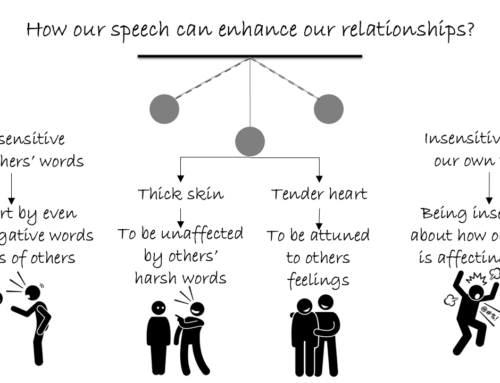When a doctor gives a medicine to a patient, the doctor’s intent may be good: to help the patient heal. Though the doctor may carefully prescribe the right medicine, it may sometimes have an unexpected side effect. Sometimes, that side effect may be so severe as to overshadow the medicine’s intended good effect. When that happens, the doctor may not be legally culpable, especially if the side effect was not known before. If the side effect was known and the doctor didn’t take it into account, then the doctor could be even legally responsible. Either way, a dedicated doctor would still take moral responsibility and try to help the patient heal.
The same principle holds true when we strive to communicate spiritual wisdom, which is like a medicine meant to cure people of their misconceptions. Sometimes we may speak a particular spiritual truth with the best intention, yet it may trigger excessive agitation among the audience. And if this agitation overshadows the illumination that the speech was supposed to bring, then a dedicated speaker will naturally feel at least morally responsible. Given the audience’s cultural, social or educational background, if the speaker could have inferred that the particular point is likely to provoke them, then the speaker’s responsibility becomes even more. Either way, when a speech affects the audience negatively, a responsible speaker will not seek justification by claiming purity of intent or correctness of content, but will do the necessary refinement to illuminate and elevate the audience.
It is toward such an ethos of holistic responsibility in speaking that the Bhagavad-gita (17.15) calls us when it states that we should not just speak the truth, but also speak it in a way that benefits the audience, while simultaneously at least not agitating them inordinately and at best pleasing them.
Summary:
Just as a doctor takes responsibility for the side effects caused by a medicine, even if it was the right medicine prescribed with the right intent, a dedicated speaker takes responsibility for the negative impact of their speech, even if that speech was delivered with the right intent and had the right content.
Think it over:
- On seeing the side effects of a prescribed medicine, how would a dedicated doctor respond?
- How does the Gita encourage an ethos of holistic responsibility in our speaking?
- In what areas do you need to take great responsibility for your speech?
***
17.15: Austerity of speech consists in speaking words that are truthful, pleasing, beneficial, and not agitating to others, and also in regularly reciting Vedic literature.



Leave A Comment